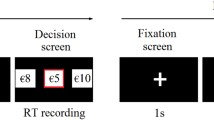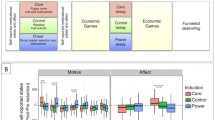Abstract
Cooperation is commonly defined as an individual’s choice that benefits both themself and others, in contrast to selfishness, which benefits the individual only. Cooperative behavior is more likely to occur when the benefit to others, discounted as a function of social distance (i.e., social discounting), is higher than the nondiscounted cost of cooperation Rachlin, H. & Locey, M. L. (Behavioural Processes 87, 25-33, 2011). We tested five 2-player prisoner’s dilemma reward matrices with 117 participants, among which both nondiscounted cost and socially discounted benefit varied systematically. Costs and benefits were defined, respectively, as the amount the participant lost and the amount the other player won when the participant cooperated. In global terms, systematically increasing costs and decreasing benefits of cooperation decreased the percentage of participants who cooperated, as predicted. These results suggest that the balance of costs and benefits of cooperation is useful for predicting cooperative behavior in social situations, such as prisoner’s dilemma games.





Similar content being viewed by others
Change history
05 January 2023
A Correction to this paper has been published: https://doi.org/10.1007/s40732-022-00530-0
Notes
The phenomenon and the procedure of social discounting have also been suggested as a metric for altruistic and selfish behavior. Altruism is an individual’s choice that benefits others but not oneself. In contrast, cooperation benefits both parties (Rachlin, 2016).
Jones (2007) asked 44 participants each to imagine a list of 100 people close to them and then to imagine themselves with those people on a vast open field. The author asked each participant to assign to some people on the list a physical distance, representing the level of closeness maintained with them. All the physical distances were converted to feet. Jones found that the function that best described the relation between ordinal and physical social distances was a power function, which was as follows: N = 2.1D0.45. The author asked another 50 students to indicate the physical distance at which they would place a random classmate, which was 2,300 feet. Substituting this value in the previous equation, N ≈ 75.
The hypothetical value of each unit was US$100.
Locey, Jones, and Rachlin (2011) used a 1-2-5-6 matrix in a prisoner’s dilemma game in order to compare the effects of real versus hypothetical rewards on cooperation; however, the cost–benefit balance as responsible of cooperation was not tested.
Locey, Safin et al. (2013) expressed the reward units to the participants in hundreds of dollars.
References
Axelrod, R. (1980). Effective choice in the prisoner’s dilemma. Journal of Conflict Resolution, 24, 3–25.
Jin, J., Pei, G., & Ma, Q. (2017). Social discounting under risk. Frontiers in Psychology, 8, 1–7.
Johnson, M. W., & Bickel, W. K. (2008). An algorithm for identifying nonsystematic delay-discounting data. Experimental & Clinical Psychopharmacology, 16(3), 264–274.
Jones, B. A. (2007). Social distance and altruistic choice (Unpublished graduate thesis). State University of New York-Stony Book. NY: Stony Brook.
Jones, B., & Rachlin, H. (2006). Social discounting. Psychological Science, 17(4), 283–286.
Jones, B. A., & Rachlin, H. (2009). Delay, probability, and social discounting in a public goods game. Journal of the Experimental Analysis of Behavior, 91(1), 61–73.
Locey, M. L., Jones, B. A., & Rachlin, H. (2011). Real and hypothetical rewards. Judgment & Decision Making, 6(6), 552–564.
Locey, M. L., Jones, B. A., & Rachlin, H. (2013). Self-control and altruism. In G. J. Madden, W. V. Dube, T. D. Hackenberg, G. P. Hanley, & K. A. Lattal (Eds.), APA handbook of behavior analysis (Vol. 1: Methods and principles, pp. 463–481). Washington, DC: American Psychological Association.
Locey, M. L., Safin, V., & Rachlin, H. (2013). Social discounting and the prisoner’s dilemma game. Journal of the Experimental Analysis of Behavior, 99, 85–97.
Rachlin, H. (2016). Social cooperation and self-control. Managerial & Decision Economics, 37, 249–260.
Rachlin, H., & Jones, B. A. (2008). Social discounting and delay discounting. Journal of Behavioral Decision Making, 20, 1–15.
Rachlin, H., & Locey, M. L. (2011). A behavioral analysis of altruism. Behavioural Processes, 87, 25–33.
Rachlin, H., & Raineri, A. (1992). Irrationality, impulsiveness, and selfishness as discount reversal effects. In G. F. Loewenstein & J. Elder (Eds.), Choice over time (pp. 93–118). New York, NY: Russell Sage Foundation.
Rapoport, A. (1974). Game theory as a theory of conflict resolution. Dordrecht, The Netherlands: D. Reidel.
Safin, V., Arfer, K. B., & Rachlin, H. (2015). Reciprocation and altruism in social cooperation. Behavioural Processes, 116, 12–16.
Safin, V., Locey, M. L., & Rachlin, H. (2013). Valuing rewards to others in a prisoner’s dilemma game. Behavioural Processes, 99, 145–149.
Toledo, A. C., & Avila, R. (2016). Do methods modulate the relation among delay, probability, and social discounting? Psychological Research Records, 6(2), 2477–2484.
Toledo, A. C., & Avila, R. (2017). Descuento social en pares de personas en diferentes posiciones sociales con respecto al individuo eligiendo. Conductual, 5(2), 61–74.
Acknowledgement
This research was supported by the grant 729552 given to the first author by CONACYT for the doctoral project 930054 and by the PAPIIT grant IN303213 given to the second author by DGAPA, National Autonomous University of Mexico. We thank Howard Rachlin, Vasiliy Safin, and Edward Dong for their suggestions.
Author information
Authors and Affiliations
Corresponding author
Ethics declarations
All procedures performed in studies involving human participants were in accordance with the ethical standards of the institutional and/or national research committee and with the 1964 Helsinki declaration and its later amendments or comparable ethical standards.
Conflict of Interest
On behalf of both authors, Aldo C. Toledo states that there is no conflict of interest.
Availability of Data and Materials
Data supporting the findings of the current article can be requested to the first author by email: aldo.toledo.92@live.com
Additional information
Publisher’s Note
Springer Nature remains neutral with regard to jurisdictional claims in published maps and institutional affiliations.
The original online version of this article was revised: The Acknowledgement section has been updated from: "Acknowledgement This research was supported by a grant (PAPIIT IN303213) from the National Autonomous University of Mexico. We thank Howard Rachlin, Vasily Safin, and Edward Dong for their suggestions." to: "Acknowledgement This research was supported by the grant 729552 given to the first author by CONACYT for the doctoral project 930054 and by the PAPIIT grant IN303213 given to the second author by DGAPA, National Autonomous University of Mexico. We thank Howard Rachlin, Vasiliy Safin, and Edward Dong for their suggestions."
Rights and permissions
Springer Nature or its licensor (e.g. a society or other partner) holds exclusive rights to this article under a publishing agreement with the author(s) or other rightsholder(s); author self-archiving of the accepted manuscript version of this article is solely governed by the terms of such publishing agreement and applicable law.
About this article
Cite this article
Toledo, A.C., Avila, R. Nondiscounted Costs and Socially Discounted Benefits as Predictors of Cooperation in Prisoner’s Dilemma Games. Psychol Rec 71, 167–178 (2021). https://doi.org/10.1007/s40732-020-00448-5
Accepted:
Published:
Issue Date:
DOI: https://doi.org/10.1007/s40732-020-00448-5




